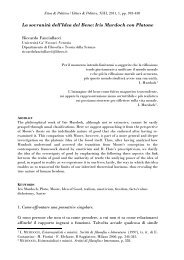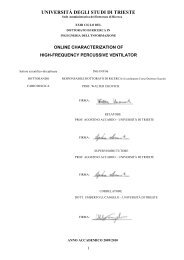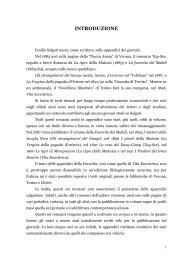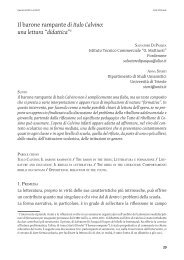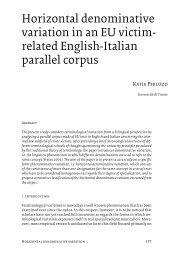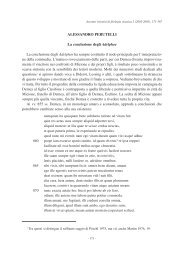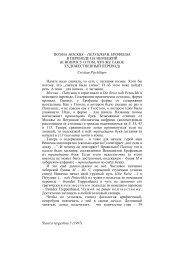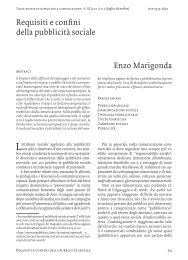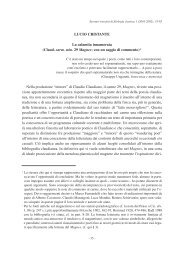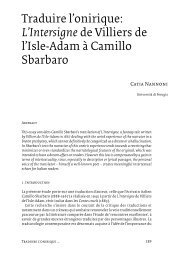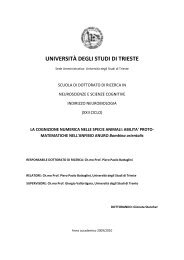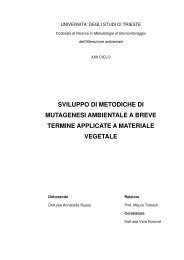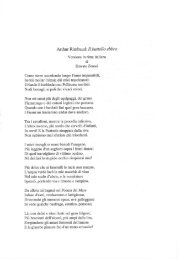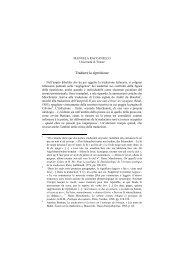Tesi dottorato Transborder Policies Chiara Barison.pdf - OpenstarTs ...
Tesi dottorato Transborder Policies Chiara Barison.pdf - OpenstarTs ...
Tesi dottorato Transborder Policies Chiara Barison.pdf - OpenstarTs ...
You also want an ePaper? Increase the reach of your titles
YUMPU automatically turns print PDFs into web optimized ePapers that Google loves.
ispondere a tutte le questioni che la tematica del confine solleva, con un binomio: modello<br />
coloniale, neocolonialismo, imperialismo e capitalismo da un lato, popoli sottomessi,<br />
espropriati e sfruttati dall'altro. Ma questo binomio è una risposta troppo semplice ed una<br />
facile scusante per placare le nostre coscienze. 32<br />
Oggi non è più sufficiente fermarsi alla mera critica rispetto a ciò che è<br />
stato. Nel corso di una conferenza che L.S. Senghor, primo presidente del<br />
Senegal indipendente e padre della negritudine, tenne all'università di<br />
Oxford, così si espresse:<br />
The focal points of human development- wrote T. Chordin in 1939- always seem to coincide<br />
with the points of contact and onostomasis of several nerve paths, that is, in the ordinary<br />
man's language, of several races. If we were justified in fostering the values of Negritude and<br />
arousing the energy slumbering within us, it must be in order to pour them into the<br />
mainstream of cultural miscegenation (the biological process taking place spontaneously).<br />
They must be our contribution to the Civilisation of the Universal. Biological miscegenation<br />
then takes place spontaneosly, provoked by the very laws which govern life and in the face of<br />
all policies of Apartheid. It's a different matter in the realm of culture. Here, we remain free to<br />
cooperate or not, to provoke or prevent the synthesis of cultures. This is an important point.<br />
For the psychological mutations brought about by education are incorporated in our genes and<br />
are transmitted by heredity. Hence the major role played by culture [….].<br />
Today our Negritude no longer expresses itself as opposition to European values, but as<br />
complement to them [….] not to be assimilated, but to assimilate.<br />
Senghor sottolinea come sia importante l'incontro e che questo incontro<br />
tra diversi sistemi sociali e modelli differenti non deve significare la<br />
prevaricazione di uno sull'altro, non l'essere assimilati ma l'assimilazione<br />
gli uni dagli altri. Solo attraverso uno scambio fruttuoso ci potrà essere<br />
una crescita, un guadagno che potrà perpetuarsi anche nel tempo. La<br />
chiave che permette di far girare questo motore è la cultura e, in questo<br />
ambito, siamo noi a decidere se cooperare o meno o, per usare le parole<br />
di Senghor, se provocare o prevenire la sintesi tra le culture.<br />
Non scontro quindi, né una supremazia del più forte (o di chi ha i mezzi<br />
per imporsi), ma complementarità. Io ho ciò che a te manca e viceversa.<br />
Entrambi abbiamo delle potenzialità rimarchevoli che messe assieme ci<br />
renderanno sicuramente più forti. Continua Senghor:<br />
Our criticism of the European thesis is that it is monstrously anti-humanistic. For if European<br />
civilisation were to be imposed, immodified on all peoples and continents, it could only be by<br />
force. [….] it would be a Universal civilisation and not be the Civilisation of the Universal<br />
[…...] Negritude is humanistic, I repeat, it welcomes the complementay values of Europe and<br />
the white man and indeed of all other races and continents. But it welcomes them in order to<br />
fertilize and re-invigorate its own values which it then offers for the construction of a<br />
civilisation which shall embrace all Mankind. The Neo-Humanism of the twentieth century<br />
stands at the point where the paths of all Nations, Races and continent cross, where the four<br />
winds of the spirit blow. 33<br />
La critica che il filosofo e poeta faceva alla politica europea era dunque<br />
di cercare di imporre uno stesso modello ovunque, senza preoccuparsi<br />
delle peculiarità di ogni popolo, negandone in sostanza la storia e<br />
32 A.O. Konaré, Presidente della Repubblica del Mali dal 1992 al 2002 e Presidente della Commissione<br />
dell'Unione Africana fino al 2008, Le frontiere in Africa dal XII al XX secolo, Conferenza UNESCO, Bamako,<br />
1999.<br />
33 R. Bernasconi, T.L. Lott, The idea of race, Hackett, 2000, pp. 136-138.



